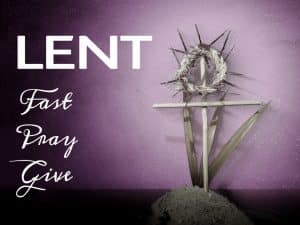
Fasting Is Not A Fad
Podcast: Play in new window | Download
Subscribe: Apple Podcasts | RSS
Intermittent fasting is the underlying premise behind many modern diets. Its popularity has grown in recent years. Some call it a fad. Nutritionists love to debate the physical efficacy of intermittent fasting. The positive spiritual aspects of fasting are beyond debate. Discover the importance of the ancient practice. Please read more.
 Intermittent fasting is an eating plan that switches between fasting and eating on some periodic schedule. One researcher, who studied intermittent fasting for 25 years, says our bodies have evolved to be able to go without food for many hours, or even several days or longer. There are many forms of intermittent fasting. One person might choose to only eat during an eight-hour period each day and fast the other 16 hours. Someone else might choose to eat only one meal a day on two specific days each week. In theory, after hours without food, the body exhausts its sugar stores and starts burning fat. The bottom line is that this type of diet plan is a form of self-denial.
Intermittent fasting is an eating plan that switches between fasting and eating on some periodic schedule. One researcher, who studied intermittent fasting for 25 years, says our bodies have evolved to be able to go without food for many hours, or even several days or longer. There are many forms of intermittent fasting. One person might choose to only eat during an eight-hour period each day and fast the other 16 hours. Someone else might choose to eat only one meal a day on two specific days each week. In theory, after hours without food, the body exhausts its sugar stores and starts burning fat. The bottom line is that this type of diet plan is a form of self-denial.
The idea of intermittent fasting for spiritual purposes has been around for thousands of years. Christian life is filled with the challenge of self-denial. Matthew 16:24 states, “Then Jesus said to his disciples, “Whoever wishes to come after me must deny himself, take up his cross, and follow me.”
 Self-denial is the act of letting go. It is an act of personal abstinence. It is a willingness to forgo one’s personal pleasures and/or desires for a greater good, especially when done as an offering to God. Fasting is just one of many ways of self-denial. The Bible is clear on the importance of self-denial and fasting. Jesus made it clear in the sermon on the mount that prayer, alms giving, and fasting are an essential part of Christian life. Most Christians, pray on a regular basis. For many, alms giving is a way of life. Fasting, on the other hand, is not quite so popular and for some Christians it is a completely foreign idea.
Self-denial is the act of letting go. It is an act of personal abstinence. It is a willingness to forgo one’s personal pleasures and/or desires for a greater good, especially when done as an offering to God. Fasting is just one of many ways of self-denial. The Bible is clear on the importance of self-denial and fasting. Jesus made it clear in the sermon on the mount that prayer, alms giving, and fasting are an essential part of Christian life. Most Christians, pray on a regular basis. For many, alms giving is a way of life. Fasting, on the other hand, is not quite so popular and for some Christians it is a completely foreign idea.
As this year’s Lenten season begins, God calls us to return to Him with our whole heart. We are encouraged to turn to prayer, fasting and alms giving. We do this in preparation to celebrate the joy of Easter more fully.
Fasting was important to Moses, Daniel, King David, and John the Baptist just to name a few. I have read that fasting is mentioned over 70 times throughout Scripture. Fasting was important to Jesus too. If fasting was important to our Savior and countless others Biblical figures, then it should be important to us as well.
 There are as many forms of spiritual fasting as there are modern diets. What works for one Christian might not work for another. Some people fast from specific foods or drinks, while others fast from specific activities like using social media or watching television. The bottom line is that fasting is a form of personal discipline. We deny ourselves in order to place our focus and attention on Jesus. Matthew 4:4 tells us, “One does not live on bread alone, but on every word that comes from the mouth of God.” John 6:35 proclaims, “Jesus said to them, “I am the bread of life; whoever comes to me will never hunger, and whoever believes in me will never thirst.” We live in a world that tells us that if we want something, we need to have it. By denying ourselves these personal pleasures and desires, we remind ourselves that Jesus is truly all we need. He is the one who sustains us. Unlike the passing benefits of a diet, spiritual fasting offers us eternal rewards.
There are as many forms of spiritual fasting as there are modern diets. What works for one Christian might not work for another. Some people fast from specific foods or drinks, while others fast from specific activities like using social media or watching television. The bottom line is that fasting is a form of personal discipline. We deny ourselves in order to place our focus and attention on Jesus. Matthew 4:4 tells us, “One does not live on bread alone, but on every word that comes from the mouth of God.” John 6:35 proclaims, “Jesus said to them, “I am the bread of life; whoever comes to me will never hunger, and whoever believes in me will never thirst.” We live in a world that tells us that if we want something, we need to have it. By denying ourselves these personal pleasures and desires, we remind ourselves that Jesus is truly all we need. He is the one who sustains us. Unlike the passing benefits of a diet, spiritual fasting offers us eternal rewards.
I would be less than honest if I led you to believe that fasting has always been a major part of my Christian journey. It has not. At best, it has been part of my Lenten observance, and even then, I have often failed to make it through the 40 days of Lent without giving into that from which I was fasting.
 Some Christians never fast, others only during Lent. All of us would likely benefit from extending this ancient spiritual practice beyond the limitations of the 40 days. This year, I am renewing my commitment to the practice of fasting. I hope you will also renew your commitment. Ask the Holy Spirit for guidance. Let Him direct you to the frequency and duration of fasting throughout the year that He knows is best suited for you.
Some Christians never fast, others only during Lent. All of us would likely benefit from extending this ancient spiritual practice beyond the limitations of the 40 days. This year, I am renewing my commitment to the practice of fasting. I hope you will also renew your commitment. Ask the Holy Spirit for guidance. Let Him direct you to the frequency and duration of fasting throughout the year that He knows is best suited for you.
As we embark on our fast, let’s be mindful of Jesus’ words from Matthew 6:16-18. There He says, “When you fast, do not look gloomy like the hypocrites. They neglect their appearance, so that they may appear to others to be fasting. Amen, I say to you, they have received their reward. But when you fast, anoint your head and wash your face, so that you may not appear to be fasting, except to your Father who is hidden. And your Father who sees what is hidden will repay you.”
Heavenly Father, help me to understand the true benefits of fasting. Help me to periodically choose the best times to fast from my wants, desires and physical needs in order to strengthen and bolster my faith and focus on your Son, Jesus. He alone is the source of eternal life. Amen!
AMDG
As always, I love to read your comments below as well as hear from you personally you can reach me by clicking here.
Please take a couple minutes to watch the video about my new book. The book is available on this website and on Amazon.com. It is also NOW AVAILABLE IN SPANISH. Please be sure to like the video and to leave a review of the book on Amazon after you have read it. Thank you!
- What Is The Church’s Role In Society? - July 21, 2024
- The Thorn Remained - July 14, 2024
- The Confounding Nature Of Freedom - July 7, 2024
